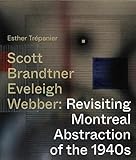Scott, Brandtner, Eveleigh, Webber : revisiting Montreal abstraction of the 1940s / Esther Tr�epanier ; translated by Judith Terry.
Material type: TextLanguage: English Original language: French Publisher: Montreal ; Kingston ; London ; Chicago : McGill-Queen's University Press, [2022]Copyright date: �2022Description: 1 online resource (270 pages) : color illustrationsContent type:
TextLanguage: English Original language: French Publisher: Montreal ; Kingston ; London ; Chicago : McGill-Queen's University Press, [2022]Copyright date: �2022Description: 1 online resource (270 pages) : color illustrationsContent type: - text
- still image
- computer
- online resource
- 0228015960
- 9780228015963
- Scott, Brandtner, Eveleigh, Webber. English
- Brandtner, Fritz, 1896-1969 -- Criticism and interpretation
- Eveleigh, Henry, 1909-1999 -- Criticism and interpretation
- Scott, Marian Dale, 1906-1993 -- Criticism and interpretation
- Webber, Gordon McKinley, 1909-1965 -- Criticism and interpretation
- Brandtner, Fritz, 1896-1969
- Scott, Marian Dale, 1906-1993
- Painting, Abstract -- Qu�ebec (Province) -- Montr�eal -- History and criticism
- Painting, Abstract -- Qu�ebec (Province) -- Montr�eal -- History -- 20th century
- Painters -- Qu�ebec (Province) -- Montr�eal -- History -- 20th century
- Peinture abstraite -- Qu�ebec (Province) -- Montr�eal -- Histoire et critique
- Peinture abstraite -- Qu�ebec (Province) -- Montr�eal -- Histoire -- 20e si�ecle
- Peintres -- Qu�ebec (Province) -- Montr�eal -- Histoire -- 20e si�ecle
- ART / Canadian
- Painters
- Painting, Abstract
- Qu�ebec -- Montr�eal
- 1900-1999
- 759.114/28 23
- ND245.5.A28 T7413 2022eb
- cci1icc
Translation of: Oubli�es: Brandtner, Eveleigh, Scott, Webber : revoir l'abstraction montr�ealaise des ann�ees 1940.
Includes bibliographical references and index.
The Origins of Abstraction in Quebec: A Contextualization -- The Polysemy of Abstraction -- Abstract, but Outside the "Ivory Tower".
"Four artists who are today relatively or almost entirely unknown--one woman and three men--nevertheless played a part in the aesthetic upheavals that led to abstraction in 1940s Montreal. Very active in the art milieu throughout the decade, Marian Dale Scott, Fritz Brandtner, Henry Eveleigh, and Gordon Webber captured the attention of critics of the time, who employed the term "abstract art" to describe both non-objective works and bold formal explorations that retained some reference to visible reality. An examination of these artists' practices reveals a remarkable openness to international contemporary art trends--French, German, British, and American. Their work and its critical reception conjure a complex picture of the debates on abstraction that took place in Montreal during the 1940s, so often reduced to the controversies surrounding the emergence of the Automatiste movement. The artistic innovations of Paul-�Emile Borduas and his group and the radical tone of their 1948 manifesto Refus global cemented their status as Quebec's abstract avant-garde but also had the effect of eclipsing other visions of abstraction being explored during the same period. This book reinstates the oeuvres of these forgotten protagonists in the narrative of abstract art, illustrating how their practices encompassed a variety of themes: emotion, science, human experience in the broadest sense--but also, as the Second World War unfolded, the violence that marked their era."-- Provided by publisher.
Co-published by Presses de l'Universit�e de Montr�eal.
Description based on online resource; title from digital title page (viewed on December 21, 2022).
Added to collection customer.56279.3
There are no comments on this title.

